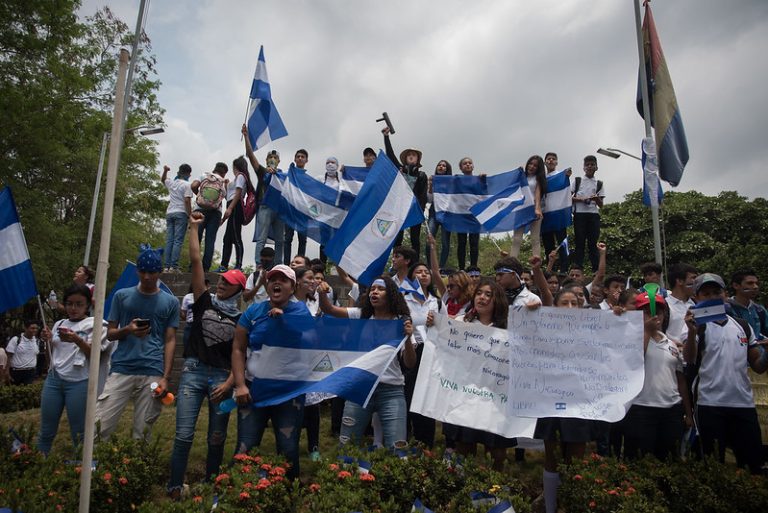26 de julio 2020

Children of Exile: The Births “Sowing Hope” in the Camp of Nicaraguan Farmers

PUBLICIDAD 1M
PUBLICIDAD 4D
PUBLICIDAD 5D
The youth of the April rebellion understood that activism is not enough to change history; to avoid being displaced, they must organize independently

Often on social networks and other opinion forums, Nicaraguan youth organized are criticized. They are branded as “well-off,” they are accused somewhat less of having “sold out” or only being good to make statements. They are admonished to stop wasting time fooling themselves with the possibility of elections. They are advised to carry out “strong actions.”
People speak so proudly of April, but it seems -and this is a constant in our country’s history-, that only death or martyrdom are appreciated. Many of the April youth who managed to stay alive, those who were prisoners or saved themselves from being incarcerated, have become again the favorite targets of attacks and considerable grievances.
The admiration, the respect that they gained in marches and barricades lasted a short time. They continue to be harassed, persecuted, exiled, detained and kidnapped, but they are called to be the country’s saviors. However, when they request organized participation in the National Coalition, they receive no answer.
The National Coalition continues discussing and putting skids under them to block an autonomous representation within it. UNAB, the Civic Alliance, and the Peasants’ Movement demanded their own spaces, with voice and vote. They claim them because they feel that they are part of the sector that played a leading role to place the Ortega dictatorship in check in the April rebellion and because they want to be in the discussions where issues that concern their future will be resolved.
Most of the members of the National Coalition have already played their political role. The failed country they leave behind is the one that young people will have to change. Therefore, they fully deserve their space. It must be recognized that this new breed practices a new way of doing politics, which does not automatically respond to political parties or to the organizations where they participate.
Unfortunately, there are also claims or disqualifications that often emanate from other young people. Mockery on social networks, tweets full of arrogance and irony, fall like an almost daily downpour on organized young people. If in April they were exalted, now they are publicly mistreated with a destructive criticism that, in my opinion, is an expression of frustration with a process that was thought, unrealistically, to free us from the dictatorship in a few months. I don’t see how accusing and insulting falls into the criticism that is sought to underpin “democracy” or “free expression.”
Within the Nicaraguan youth of April, many correctly understood that activism is not enough to change history. Just look at what happened in several countries where there were large popular mobilizations that, at the time of change, were not organized and were displaced. The way to avoid this result is to organize and achieve structures that work beyond marches or taking over plazas.
The Civic Alliance and UNAB may not be perfect, but the young people who are there are not decorative. They are living the reality of what it is to be part of diverse and complex groups where age is not the determining factor, where the mix of maturity and youthfulness is enriching, even if it is not fully satisfactory to them.
It’s not the same to lead marches or resist in barricades, however heroic that may be, than to deal with daily political processes, negotiate differences, devise strategies, work on country plans, or structure demands for free elections.
The route that was marked by April is clear and well-known. What is difficult is to find how to achieve results amid a fierce repression, espionage, pandemic and a hostile environment among peers, where judgments are passed lightly and ruthlessly, honor is butchered, intentions are questioned and where instead of proposals and analysis, complaints and low blows are delivered.
So many critics seem to have the “knowledge” of what resounding actions would be necessary, but instead of sharing their ideas, they complain because others either don’t support them, or do not share them. I wonder what discomfort and psychologic effect in young people the irony and cruel sarcasm I see sometimes against one another on social networks must have.
I applaud those who, despite criticism, insults, and disqualifications, continue ahead at least participating, organizing, protecting their freedom and their lives to build the future tenaciously, and without pretending to be heroes.
Archivado como:
PUBLICIDAD 3M
Poeta y novelista nicaragüense. Ha publicado quince libros de poemas, ocho novelas, dos libros de ensayos, una memoria, y cuatro cuentos para niños. Su primera novela “La mujer habitada” (1988) ha sido traducida a más de catorce idiomas. Ganadora del Premio La Otra Orilla, 2010; Biblioteca Breve, de Seix Barral (España, 2008); Premio Casa de las Américas, en Cuba; Premio Internacional de Poesía Generación del ‘27, en España y Premio Anna Seghers de la Academia de Artes, de Alemania; Premio de Bellas Artes de Francia, 2014. En 2023 obtuvo el premio Reina Sofía de Poesía Iberoamericana, el más prestigioso para la poesía en español. Por sus posiciones críticas al Gobierno de Daniel Ortega y Rosario Murillo, fue despatriada y confiscada. Está exiliada en Madrid.
PUBLICIDAD 3D